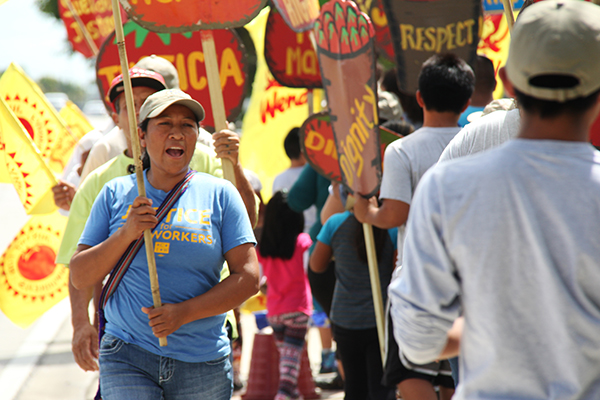
“The coalition… has long been a guiding light for the farmworkers’ rights movement…”
Today, we bring you highlights from a brand-new article from Teen Vogue, the youth arm of Vogue Magazine with over one million readers – and a surprisingly strong new voice in the country’s growing political conversation!
Earlier this week, contributor Kim Kelly published a new in-depth article, titled “Unsung Heroes of Latinx Farmworkers’ Labor Movement, from Maria Moreno to Fast Food Boycotters.” The piece provides a well-researched history, dating back decades, of the grassroots efforts of farmworkers to transform U.S. agriculture from California to Florida, particularly highlighting the leadership of women in the movement. After exploring the long history of farmworkers organizing in California in the 1960s to fight labor exploitation in the fields, Kelly turned to the CIW as the leading example of a modern, grassroots movement that has is transforming the agricultural industry, Finally, Kelly touches on the ongoing efforts to expand the Fair Food Program through the corporate campaign, and encourages the magazine’s famously socially-conscious – and active – audience to Boycott Wendy’s!
Here below is a brief excerpt from Teen Vogue‘s article (which you can read in full here!):
Unsung Heroes of Latinx Farmworkers’ Labor Movement, from Maria Moreno to Fast Food Boycotters
…Agricultural work remains one of the most dangerous occupations in the United States. They are not covered under the most major labor laws, like the National Labor Relations Act of 1935, which protects workers’ right to form unions and the Fair Labor Standards Act of 1938 (FLSA), which mandates a minimum wage, but didn’t cover farmworkers until 1966 and still only covers workers on farms with approximately seven or more employees. As predominantly seasonal, temporary workers, most farmworkers do not have access to health insurance. In addition, there have been multiple major investigations into modern slavery practices on American farms. In a direct continuation of the exploitative sharecropper system that kept Black and poor white tenant farmers in a state of feudal bondage after the Civil War, some modern-day migrant workers have been held captive by armed guards, abused, and forced to work for no pay.
Thanks to tireless efforts by the Coalition of Immokalee Workers — a worker-led grassroots farmworkers’ rights organization based in the major agricultural hub of Immokalee, Florida — the U.S. government has successfully prosecuted eight cases of slave labor on Florida farms since the CIW began their anti-slavery campaign in 1992. The coalition, which operates under the slogan, “Todos somos lideres (We are all leaders),” has long been a guiding light for the farmworkers’ rights movement.
“We were not ‘given our rights. It is not even ‘we took our rights,’” Gerardo Reyes, a longtime CIW member-organizer, said in Susan L. Marquis’s 2017 book, I Am Not A Tractor! How Florida Farmworkers Took on the Fast Food Giants and Won. “Instead, we created our rights.”
The CIW spearheaded the Fair Food Program, which provides workers with education and resources to understand their rights, mandates a penny-per-pound premium to benefit workers’ pay, and via regular third-party inspections from the Fair Food Standards Council, ensures that safety standards are met on participating farms. Certain violations of the program’s code of conduct trigger the suspension of their membership — and they lose the ability to sell their produce to its participating buyers, which include 14 major corporations like McDonald’s, Subway, Trader Joe’s, Whole Foods Market, and Walmart.
ICYMI: Video from the New York City @Wendys Boycott action! #BoycottWendys pic.twitter.com/l28BaL3oUl
— CIW (@ciw) July 26, 2018
The CIW won this victory through years of organizing and direct action including strikes, marches, and nationwide boycott campaigns targeting fast food giants like Taco Bell (which was the CIW’s first target and the first to sign in 2005), Burger King (which joined the program in 2008), and Wendy’s (which continues to refuse to take the pledge and is the target of an ongoing boycott). Earlier this year, CIW activists undertook a five-day hunger strike outside a Wendy’s corporate bigwig’s office in New York City to protest the chain’s refusal to participate. (A Wendy’s rep said the company won’t join because it “will not compromise our commitment to our customers.”) As of now, the fight continues (as does the boycott—so boycott Wendy’s!).
Make sure to check out the full piece at Teen Vogue‘s website!

